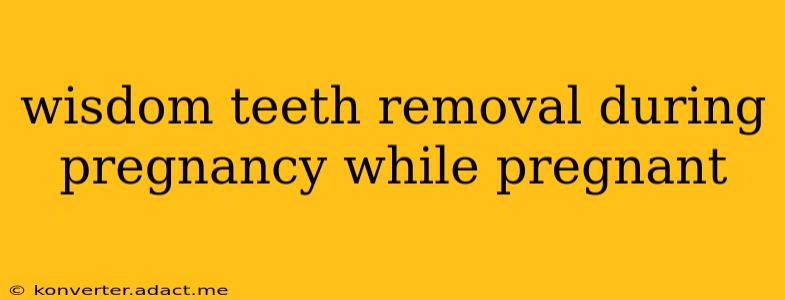Having wisdom teeth removed is a common procedure, but the decision becomes significantly more complex during pregnancy. The hormonal changes, potential risks to the developing fetus, and the increased vulnerability of the mother all necessitate careful consideration. This comprehensive guide explores the complexities of wisdom teeth removal while pregnant, addressing common concerns and offering insightful advice.
Is it Safe to Remove Wisdom Teeth While Pregnant?
This is the most frequently asked question, and the answer is nuanced. It's not inherently unsafe, but it's not generally recommended, especially during the first and third trimesters. The risks associated with the procedure and anesthesia need to be carefully weighed against the potential risks of delaying treatment. Each case requires a thorough assessment by both an oral surgeon and an obstetrician.
Risks of Wisdom Teeth Removal During Pregnancy:
- Anesthesia: The type and amount of anesthesia used can pose risks to the fetus, particularly during the first trimester when organ development is crucial.
- Infection: The risk of infection is higher after any surgery, and pregnancy can complicate the body's ability to fight infection. An infection during pregnancy can have serious consequences.
- Stress and Anxiety: The stress of surgery can affect both the mother and the fetus.
- X-rays: While modern dental X-rays use minimal radiation, exposure should be minimized during pregnancy. Often, alternative imaging methods are used.
- Medication: Some pain relievers and antibiotics commonly used after wisdom teeth removal may not be suitable for pregnant women.
When is Wisdom Teeth Removal During Pregnancy Most Risky?
The first trimester (weeks 1-12) and the third trimester (weeks 28-40) are generally considered the riskiest periods for wisdom teeth removal. During the first trimester, the fetus's organs are developing, making it particularly vulnerable to the effects of anesthesia and medication. In the third trimester, the increased size of the uterus can make it difficult to lie comfortably during the procedure, and there's a higher risk of complications due to the added strain on the mother's body.
What are the Alternatives to Wisdom Teeth Removal During Pregnancy?
If possible, delaying the procedure until after delivery is the safest option. However, if the impacted wisdom teeth are causing significant pain, infection, or other serious complications, the dentist and obstetrician may recommend proceeding with the removal. In some cases, less invasive treatments like managing pain with medication or addressing an infection with antibiotics may be considered.
How Can I Manage Pain and Infection Before Delivery?
Managing pain and infection during pregnancy requires careful consideration. Always consult your dentist and obstetrician before taking any medication. They can recommend safe and effective options to alleviate discomfort and address infection. Maintaining excellent oral hygiene is also crucial during pregnancy.
What Happens After Wisdom Teeth Removal During Pregnancy?
Post-operative care after wisdom teeth removal during pregnancy is similar to that for non-pregnant individuals, but with additional considerations for medication and infection control. Close monitoring by both the oral surgeon and obstetrician is crucial.
Can I Breastfeed After Wisdom Teeth Removal?
Breastfeeding after wisdom teeth removal is usually possible, but some pain relievers and antibiotics may not be compatible with breastfeeding. Consult your doctor and dentist to discuss medication options that are safe for both you and your baby.
When Should I Consult a Dentist or Oral Surgeon During Pregnancy?
Any dental pain, swelling, or infection during pregnancy should be addressed promptly. Regular checkups with your dentist are recommended, and any concerns about wisdom teeth should be discussed openly.
This information is for educational purposes only and should not be considered medical advice. Always consult with your dentist, oral surgeon, and obstetrician before making any decisions regarding wisdom teeth removal during pregnancy. They can provide personalized advice based on your individual health status and circumstances.
